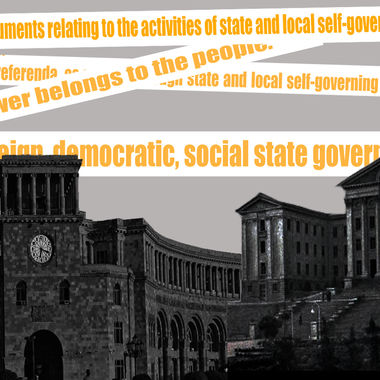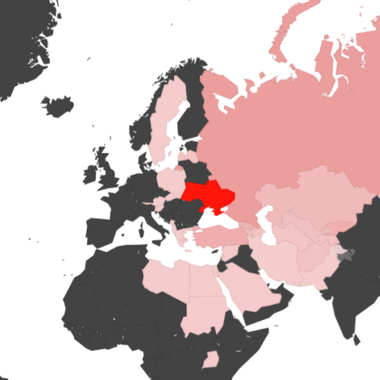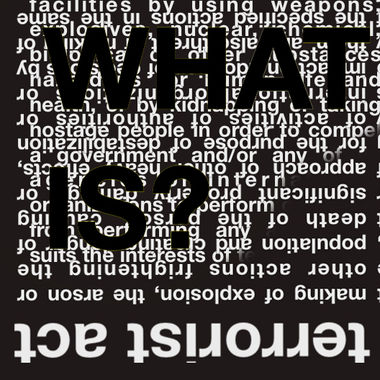Thu Aug 08 2019 · 8 min read
On the Elaboration of Armenia’s New National Security Strategy

By Sossi Tatikyan

On July 16, Prime Minister Nikol Pashinyan signed a decree on the establishment of an Inter-agency Committee for the elaboration of a National Security Strategy (NSS), including the composition of the Committee and its rules and procedures. The committee coordinating the development of the strategy is set up under the leadership of the Secretary of the Security Council (SC), consisting of Ministers, the Director of the National Security Service, Chief of the Defense Staff, Chief of Police, heads of financial institutions, Chair of the Standing Committees of the National Assembly (NA) on Foreign Relations and Defense, Chief of Staff of the President and the President of the National Academy of Sciences. The SC Secretary is to submit the draft NSS to the SC and Prime Minister for approval within one year. The Committee conducted its first session on July 30 and a consultation with a number of representatives of civil society on July 31.
The current and outdated NSS was adopted in January 2007. At first glance, it has all the necessary components that an NSS should have. However, it has remained a largely superficial and declarative document since some of the values and principles defined in it, such as promotion of human rights, democracy and good governance weren’t fully respected and promoted. Besides, it is more of a policy than a strategy since it identifies threats in the areas affecting security such as defense, internal security, economy, energy, environment, food, information, demography, science, education and culture; however, it doesn’t offer responses to address them. It also has an over emphasis on foreign policy, external defense and public security.
This is conditioned by the specific geopolitical situation of Armenia – lack of diplomatic relations with two out of four neighbors, a consistent conventional defense threat by one of them, a possible direct or indirect defense threat by another, difficult geopolitical situation of the remaining two neighbors themselves, clash of the Russian, Euro-Atlantic, Turkish and Iranian interests in the region, as well as concerns related to the democratic developments threatening the sustainability of power of the previous ruling elite. At the same time, resolution of the two key challenges – the Artsakh conflict and Armenian-Turkish relations haven’t registered progress, which may indicate the need for rethinking approaches to them. Armenia's declared complementary (followed by multi-vector) foreign policy has largely remained declarative as well with an obvious lack of balance between the level of its relations with Russia and the West.
Since 2007, many things have changed on the international, regional and national scenes. The notion of security has widened, embracing not only the state and hard security, but also human security, including its development - and human rights - related aspects. It is recognized that there is no security without development and no development without security. While previously there was a tendency to restrict human rights to achieve higher security, presently violation of human rights is considered a security threat.
Globally, Russia and the West have reignited tensions loosely resembling the Cold War, the war in Syria and the creation of the Islamic State complicated the situation in the Middle East further, the nature of terrorism changed, Europe experienced a migration crisis, the Iran nuclear deal did not hold and the U.S. re-imposed sanctions against Iran, cyberterrorism, information and hybrid warfare became common, and climate change emerged as a new disturbing threat. Regionally, the Georgian-Russian war took place, the Eurasian Economic Union was created and Armenia became both its member and a signatory of the Comprehensive Enhanced Partnership Agreement (CEPA) with the European Union. Nationally, Armenia experienced a large-scale military aggression by Azerbaijan in April 2016, and violations of the ceasefire regime and militaristic propaganda by Azerbaijan intensified; the country also experienced an armed rebellion by a fringe group calling themselves the “Sasna Tsrer” in 2016 and finally, a non-violent change in political power through the Velvet Revolution in 2018, followed by an ongoing period of transition.
Usually, a review mechanism is established to update the NSS on a regular basis, such as once every five years, and upon major transformations in national, regional and international security, such as war, conflict and change in power to encourage a break with the past and transition to a new system. The lack of initiative to update the NSS for 12 years is yet another indication of stagnation and lack of strategic planning in the public administration of Armenia during the last decade. Even if delayed, the momentum of the development of a new NSS is well chosen: although it was expected shortly after the revolution, the ensuing euphoria could have resulted in an unrealistic strategy. More than a year later, both the authorities and society have a more realistic assessment of the situation and sound expectations for the future.
There is barely any country that has both a national security policy (NSP) and an NSS - countries mostly choose one or the other format. Although both NSP and NSS provide a strategic framework to address the security needs of the State and its people, there is a distinction between them. NSP defines the vision, values, interests, objectives and principles of the security architecture, and analyzes the strategic environment, historical lessons learned, threats, challenges and opportunities. In addition to the components outlined in an NSP, the NSS needs to offer a roadmap on how to achieve those objectives, respond to threats and challenges, use opportunities, defines labor division, interdependence and cooperation between sectors and institutions, allocation of human capacity and financial resources, and finally, oversight and coordination of the implementation of the strategy.
NSS should involve not only external defense, public security and foreign security policy but also demography, energy security, environment, governance, justice, human rights, economy, health, food security, education and any other area to the extent of its impact on the state and human security. Therefore, it should go beyond the organizational boundaries to address linkages and cross-cutting issues. For instance, poverty, violation of human rights and lack of faith in the justice system may result in civil unrest that may result in a change in political power, or migration affecting the demography of the country, which will in its turn decrease the strength of the army. Lack of diversification of energy sources both in terms of natural resources and partner countries results in limitations in sovereign decisions in foreign relations. Violence and discrimination against women are a human security threat, and one of their demonstrations is sex-selective abortions that create disbalance in the demography with a range of consequences. Achieving the right balance between the preservation of national identity and unity amongst Armenia, Artsakh and integration of universal values, ensuring modernization and innovation in light of globalization is another challenge.
Armenia has chosen to develop an NSS versus NSP, which needs to be applauded as a more advanced type of a strategic framework adding planning to the vision. However, this endeavor should not be perceived as a formality to check a box in the eyes of the public and the international community. It should be understood that the outdated strategy was actually rather a declarative policy, and this time an effort should be made to develop an implementable strategy. Even the best vision and policy are devalued when they are not accompanied with a strategic roadmap and are not put into practice. They are either not perceived as credible, or raise unrealistic expectations and result in disappointment if not implemented. This is especially risky, more than a year after the change in power in Armenia when the euphoria is significantly decreased, and the public expects fundamental and even radical economic and institutional reforms with tangible results in line with promises of the revolution.
The development of an NSS may be followed by a holistic security sector reform strategy, focused on the core actors of national security, as well as sectoral action plans of its individual institutions, forces and services, such as defense, police, national security service and civil protection. The Ministry of Defense published its vision in 2018, which outlines seven priority goals, thus bordering a defense policy.
An NSS should not be a standalone instrument, but should be coherently linked and harmonized with the “Armenia Transformation Strategy 2050,” which is under development at the PM’s Office. It is important to achieve balance in public expenditures for different sectors. Allocation of a significant portion of the state budget to the defense and internal security sectors unavoidably occurs at the expense of the wider development priorities, such as economy, education and health. Security sectoral plans should be aligned with development sector strategies in line with the 17 Sustainable Development Goals set by the UN.
The prime minister’s decree has allocated a whole year to the elaboration of this strategy, which signifies an intention not only to update it but to develop a qualitatively new document through a comprehensive dialogue with national stakeholders. The NSS should not be a partisan document reflecting the agenda of the ruling political elite, but should be based on consensus among the executive and legislative authorities, various institutions of the government, civil society and expert community, and compliant with international standards to increase the trust among the state, the public and the international community. It is important to ensure the inclusivity of the process, but without the risk of jeopardizing by involving radical or marginalized political factions that could prevent reaching consensus on the content of the strategy. Apart from the Intergovernmental committee at the strategic level, it is necessary to put in place a working level drafting team consisting of competent and qualified members with strategic planning skills, capable to brainstorm, shape opinions and reach consensus among the actors involved. Experts and representatives of civil society need to be either involved in the drafting committee or be regularly consulted. In many countries, NSSs are approved by the parliament, and since Armenia has adopted a parliamentary system, parliamentary factions need to be involved both in the elaboration and approval of the strategy. When there is an intention of amending the Constitution and primary legislation in parallel, the development of an NSS should be harmonized with them as well.
When the country is undergoing transition and transformation, the development of such a strategy requires visionary leadership to transpire a change of mindset, thinking out of the box, questioning of old stereotypes, thinking over dilemmas and make decisions on difficult issues. The process of the elaboration of the strategy is as important as its result since it enhances strategic planning skills of the national stakeholders.
Read also
From National Security to the Concentration of Power
By Lusine Sargsyan
A newly adopted law on the “Formation and Activity of the Security Council” was recently passed in parliament that gives the new prime minister more powers over the country’s defense policy. This law came into effect to comply with the package of reforms that was passed in the 2015 Constitutional referendum.
Oligarchies and Strategic Danger to Small-State Security
By David Davidian
While some large-state oligarchies can be operationally benign to citizens, the multidimensional social and economic conditions resulting from small-scale oligarchy creates an inherent danger to national security. The state must free its captive markets by allowing equal treatment under the law for all competitive ventures.
Armenia at the Center of State-Sponsored Cyber Attacks
By Samvel Martirosyan
A close look at cyber operations against Armenian state and non-state institutions, as well as individuals highlights a number of well known cases behind which are state-sponsored hacker groups or even state structures themselves. Samvel Martirosyan writes about how Armenia, in recent years, has become a subject of interest in almost all major cyber investigations.
An Unfinished Revolution
By Maria Titizian
During an hour-long speech in Stepanakert, Prime Minister Nikol Pashinyan set out his government’s strategic goals for 2050. However, 24 hours earlier, he disclosed that a secret document from the previous regime had confirmed the country was in a state of institutional collapse.
Terrorism and the Definitional Issue in the Armenian Legal System
By Smbat Khachaturian
Defining terrorism is the most ambiguous component in terrorism studies, writes Smbat Khachaturian. In light of the current geopolitical situation, the high level of terrorist threats in the region, as well as the transformation of terrorism itself, Armenia must precisely define terrorism and draft a new anti-terrorism law.







